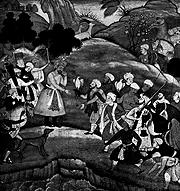Pick a Region:.
. South Asia:.
. Kashmir

Islam Became the Dominant
Religion
The early history of Kashmir is shrouded in confusion and uncertainty.
From the 8th through the 14th centuries, Kashmir was divided into
many small kingdoms controlled by a succession of Hindu dynasties.
Islam was introduced into India in the 8th century by both peaceful
and warlike methods. It only gradually spread to Kashmir.
 In 1346,
Udiana Deva, the last Hindu king in Kashmir, was murdered by his Muslim
prime minister. Amir Shah soon enacted policies that forcefully encouraged
Hindus to convert to Islam or to leave Kashmir. During the next 231
years, most Hindus had converted or left the province. Then the
Mughal dynasty under Akbar (see History)
conquered the area and permitted greater tolerance toward Hinduism. Caption:
grand ceremony of presentation of white falcon to Great Mughal Emperor
Akbar. Image © 2000 www.arttoday.com In 1346,
Udiana Deva, the last Hindu king in Kashmir, was murdered by his Muslim
prime minister. Amir Shah soon enacted policies that forcefully encouraged
Hindus to convert to Islam or to leave Kashmir. During the next 231
years, most Hindus had converted or left the province. Then the
Mughal dynasty under Akbar (see History)
conquered the area and permitted greater tolerance toward Hinduism. Caption:
grand ceremony of presentation of white falcon to Great Mughal Emperor
Akbar. Image © 2000 www.arttoday.com
Afghan
invaders seized Kashmir in 1752 and reintroduced policies to encourage
the spread of Islam again.
Ranjit
Singh Controlled Kashmir
In 1819, the Sikhs under Ranjit Singh seized control of Kashmir, and
the number of Hindus and Sikhs in the area increased. Ranjit Singh,
the dominant Sikh ruler, awarded Jammu to Gulab Singh, one of his
top generals, in 1837. Gulab Singh, the founder of the
Dorga dynasty, soon added territory--Ladakh and Baltistan in 1837
and Gilit and Kashmir in 1846--to his kingdom. Gulab gained control
of Kashmir after siding with the British against his fellow Sikhs.
He agreed to follow pro-British policies and paid 1,000,000 British
pounds for the territory.
Four members
of the Dorga family ruled as Maharajas
of Kashmir from 1837 until the territory was merged into India in
1949. The Maharajas had two capitals--Jammu in the winter, and Srinagar
in the summer--in their territory.
Maharaja
Bahadur Was Opposed by Sheik Abdullah
Maharaja Hari Singh Bahadur (r.1925-1949), the last of the Dorga rulers,
favored Hinduism and Sikhism at the expense of the Muslim majority.
Upper caste Hindus owned much of the land in Kashmir and held most
of the important positions in the government administration. In 1931
Bahadur permitted the formation of political parties for Hindus and
Sikhs, but not for Muslims.
An autocratic
ruler, Bahadur refused to encourage the modernization of his kingdom,
and little tax revenue was spent on education, social services, or
improvements in the kingdom's infrastructure. As adjacent areas of
British India began to modernize, Bahadur faced increasing pressure
to share his power with his people.
In the
early 1930s Sheik Mohammed Abdullah opposed Maharaja Hari Singh Bahadur’s
policies. Influenced by the rise of nationalist
movements in British India, Abdullah led a Muslim reform movement.
This movement demanded two things:
- the right to organize
a Muslim political party to represent the majority of the people
in the kingdom, and
- opportunities for Muslims
to serve in the army and government bureaucracy.
In the 1930s Bahadur jailed
Abdullah several times for his political activities.
Abdullah’s vision
of the subcontinent's future was close to that of his good friend,
Jawaharlal Nehru, one of the leaders
of the Indian National Congress
Party. Abdullah opposed the partition of British India into a
Muslim and Hindu state, but he favored the creation of a
secular society and socialist
economic policies.
Muslims in Kashmir Support
Different Leaders
As independence neared and the Muslim
League pushed for partition against the attempts to preserve unity
by the Indian National Congress Party, the Muslims of Kashmir also
split. A minority of Muslims continued to support Abdullah, but the
majority began to support his chief rival, Ghulan
Abbas, who had at one time been one of Abdullah's closest friends
and political advisors. Abdullah and Abbas became bitter foes. In
1946 Abbas became the leader of the Muslim Conference in Kashmir,
which became closely allied to the Muslim League.
Bahadur threw both men
into prison in 1946 and sought ways to preserve the independence of
his kingdom from India and Pakistan.
|

